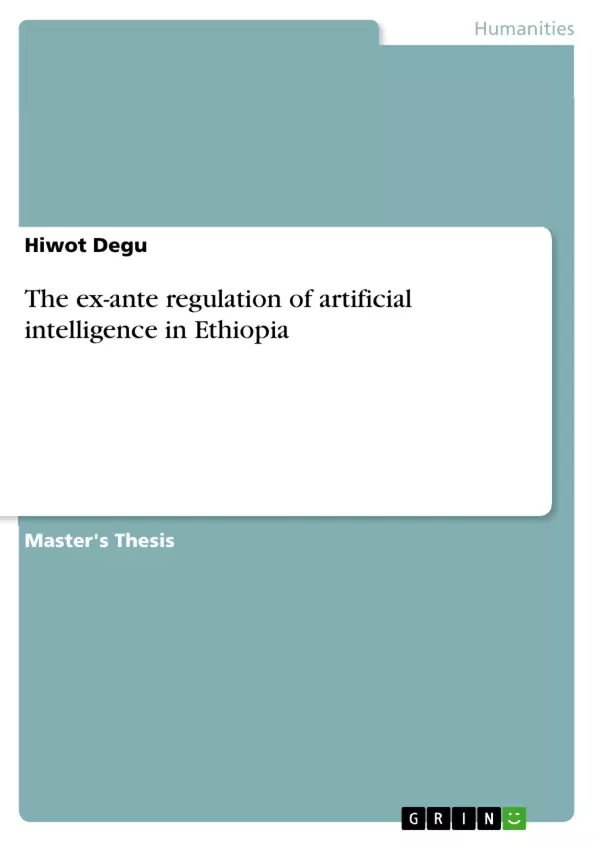Artificial intelligence is one of the newly emerging technologies which are creating new challenges to the existing laws and raising serious survival questions. Regarding the relation of artificial intelligence and the law, there are serious concerns on how the law regulates artificial intelligence as it is now being more difficult for traditional public regulatory bodies to control the development of AI. Some form of regulation is likely necessary to protect society from harm. Due to the power and complexity of this new emerging technology, Regulation can, indeed, be very impactful, but it also carries risks. This thesis tried to solve this difficulty and examined different issue to answer whether artificial intelligence should be regulated or not and, if so, which basic principles should be followed and who are the suitable organs to regulate it. It also demonstrated the intricacy of this newly emerging technology as it has its own positive and negative consequences on the life of the society. Since the AI technology is prevailing constantly from time to time and its involvement is increasing in every aspect of activities such as factories or hospitals, the particular research emphasized the need for the development of AI that reconciles with its Ethical, legal as well as social issues. To this end, the issue of ex-ante regulation was underscored as a necessity to handle the potential challenges of AI in a formal way.
Inhaltsverzeichnis (Table of Contents)
- Chapter-One
- 1. The Introduction
- 1.1. Background
- 1.2. Statement of the Problem
- 1.3. Objectives of the Research
- 1.3.1. General Objectives
- 1.3.2. Specific Objectives
- 1.4. Research Questions
- 1.4.1. Main Question
- 1.4.2. Specific Questions
- 1.5. Significance of the Study
- 1.6. Research Method and Methodology
- 1.6.1. Research Methodology
- 1.6.2. Research Method
- 1.7. Limitation of the Study
- 1.8. Scope of the Study
- 1.9. Organization of the Chapters
- 1.10. Ethical Consideration of the Study
- Chapter Two
- 2. Conceptual and Theoretical Framework of Artificial Intelligence
- 2.1. Definition and Nature of Artificial Intelligence
- 2.2. Philosophy and Theory of Artificial Intelligence
- 2.3. History of Artificial Intelligence
- 2.4. The Interplay between Science, Law, and Technology
- 2.5. Principles and Rule
- Chapter Three
- 3. The Regulation of Artificial Intelligence
- 3.1. General Concepts of Regulation and ex-ante Regulation
- 3.1.1. Definition of Regulation
- 3.1.2. Definition of ex- ante Regulation
- 3.1.3. Rationales behind Regulation and ex-ante Regulation
- 3.1.4. Advantages and Disadvantages of Regulating Artificial Intelligence
- 3.1.4.1. Advantages of Regulating AI
- 3.1.4.2. Disadvantages of Regulating AI
- 3.1.5. Significance of ex-ante Regulation of Artificial Intelligence
- 3.2. Competent Government Organs to Regulate AI
- 3.2.1. The Legislature
- 3.2.2. The Executive
- 3.2.3. Suitable Regulatory Institution
- 3.4. Legal Liability of Artificial Intelligence
- 3.4.4. Allocation of AI Liability (comparative perspective)
- 3.5. Ethics of Artificial Intelligence
- CHAPTER FOUR
- The Assessment of Development and Legal Framework of Artificial Intelligence in Ethiopia
- 4.1. The Embracement of Ethiopia for Artificial Intelligence
- 4.2. Current Impact of Artificial Intelligence in Ethiopia
- 4.3. Existing Regulations and Artificial Intelligence
- 4.3.1. General Policy Framework
- 4.3.2. Subsidiary Legislation
- 4.3.2.3. The Ownership or Property Rights of Artificial intelligence
- 4.3.2. Tangibility of Artificial Intelligence
- 4.4. Challenges Posed by AI on Existing Jobs
- CHAPTER FIVE
- viCONCLUSIONS AND RECOMMENDATIONS
- 5.1. CONCLUSION
- 5.2. RECOMMENDATION
- The definition, nature, and philosophy of Artificial Intelligence
- The interplay between science, law, and technology in the context of AI
- The regulation of artificial intelligence, particularly focusing on ex-ante regulation
- The legal liability of artificial intelligence and the allocation of AI liability
- The ethical considerations surrounding artificial intelligence
- Chapter One introduces the study, outlining its background, problem statement, objectives, research questions, significance, methodology, limitations, scope, and ethical considerations.
- Chapter Two delves into the conceptual and theoretical framework of artificial intelligence. It defines AI, explores its philosophical and theoretical underpinnings, examines its history, and discusses the interplay between science, law, and technology in the context of AI.
- Chapter Three focuses on the regulation of artificial intelligence. It defines regulation and ex-ante regulation, explores the rationales behind such regulation, examines its advantages and disadvantages, and discusses the significance of ex-ante regulation in the context of AI. The chapter also identifies competent government organs to regulate AI, including the legislature, the executive, and potential regulatory institutions.
- Chapter Four assesses the development and legal framework of artificial intelligence in Ethiopia. It examines the country's embracement of AI, analyzes its current impact, explores existing regulations, and discusses challenges posed by AI to existing jobs.
Zielsetzung und Themenschwerpunkte (Objectives and Key Themes)
This thesis examines the ex-ante regulation of artificial intelligence in Ethiopia. It investigates the current state of AI development and its legal framework in Ethiopia, analyzing its potential impact on jobs and existing regulations. The study aims to identify key challenges and propose recommendations for the development of a robust regulatory environment for AI in Ethiopia.
Zusammenfassung der Kapitel (Chapter Summaries)
Schlüsselwörter (Keywords)
Artificial intelligence, ex-ante regulation, legal framework, Ethiopia, AI development, legal liability, ethics, job displacement, policy framework, subsidiary legislation, ownership, property rights, tangibility.
- Quote paper
- Hiwot Degu (Author), 2019, The ex-ante regulation of artificial intelligence in Ethiopia, Munich, GRIN Verlag, https://www.grin.com/document/493894



